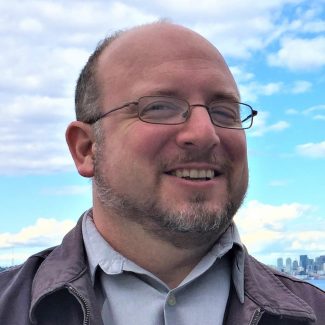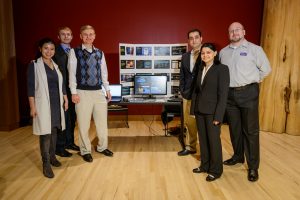Lighting a Path to Entrepreneurship

Aaron Bodmer, TMMBA 2017
For Aaron Bodmer (TMMBA ’17), the road to entrepreneurship took many twists and turns. Over the past two decades, Aaron has built an accomplished career – from various technical roles to work in the Army as a Signals Intelligence Analyst. He has also worked at several startups along the way to his current venture.
Through this winding journey, Aaron always carried a passion for entrepreneurship. And more specifically, a passion for starting a business that addressed climate change. But how to put this passion into action? In 2015, he made the big decision to move across the country from Massachusetts to Washington, where he could connect with the thriving Seattle startup community to build a strong network and gain momentum with his business idea.
As he mapped out his path to launch his business, he was drawn to the Foster Technology Management MBA (TMMBA) Program; it offered exactly what he was looking for – an MBA, from a highly ranked institution, that was designed for technology managers and entrepreneurs. Aaron joined TMMBA in January 2016 and immersed himself in the entrepreneurially focused coursework. He also left no resource unused. From networking events to career boot camps and the TMMBA Mentoring Program, he used these offerings to develop his business and network.
TMMBA is community of professionals supporting one another throughout their careers. That’s unique in my experience and wonderful to be a part of.
Fast forward to current day. After graduating from TMMBA in June 2017, Aaron is now co-founder and CEO of Eboro SPC, a company that aims to bring new solutions to renewable energy project development. His company is addressing the monumental issue of climate change, creating a platform to enable people to invest directly in solar and wind farms.
Read more about Aaron’s TMMBA experience and journey into entrepreneurship:
On TMMBA
What were your goals when you entered the TMMBA Program?
My goal was to prepare myself for launching a startup I had in mind – something that would contribute to the effort to address climate change. I knew I’d need to find co-founders, learn how to communicate with potential investors, do market research, and speak the language of business generally. Coming from an IT background, I’d had some exposure to these areas, but not to the extent I expected to need as a founder.
How has the TMMBA Program impacted your career since graduation in June 2017?

Aaron and his TMMBA teammates during the 2017 Entrepreneurship Expo – a component of the Entrepreneurial Influence and “the Pitch” course.
I left the Program much more confident about the general aspects of management that one would learn about in any MBA program, but what was unique was that I had been exposed to classes specifically meant to address the challenges I would face as an entrepreneur.
There was a class on Entrepreneurial Finance, where we covered matters like term sheets, venture capital, and other topics that are essential for an entrepreneur to understand.
Another example is Entrepreneurial Influence and “The Pitch” – how to communicate and sell your business concept to co-founders, early hires, customers, and investors. That was taught by someone from Seattle’s venture capital community – one of any number of ways that the Foster’s School’s engagement with the startup community in Seattle has direct benefits to the students.
All of which is to say, the curriculum itself offered me preparation for a entrepreneurial venture that I do not think I would have received from most other programs. It also connected me to an alumni network that includes other entrepreneurs and staff at local startups.
What is your advice for someone considering TMMBA?
Take the time to visit and sit in on a class or attend one of the various informational sessions the Program puts on throughout the year. I flew out to Seattle the spring before I applied and met with program staff at an event, visited the UW campus, and asked questions. Everyone was helpful and my only regret is that I didn’t schedule it so I could sit in on a class.
That said, during the Program we had a number of prospective students sit in, and I think they really benefited from being able to speak with current students before class and during the break.
On Entrepreneurship
Tell us about your business.
I launched my current startup this year with a co-founder I met during my time at Kennedy Space Center. We’re working to develop a platform for renewable energy project finance. We think there’s a huge opportunity at the smaller end of the scale, projects from a few tens of kilowatts up to tens of megawatts, where the current financing options are not serving the market well. If successful, we hope to accelerate the renewable energy build-out in wind and solar, and give more people the opportunity to invest in clean energy, without needing to be a home owner putting residential solar on their roof.
At what point did you decide to take the leap and start your own business?
Before graduation. It was really the reason I moved to the area and pursued the MBA in the first place. I tend to be very mission-oriented as a personality, and I need more from my work than just a paycheck; I need to know that we’re doing something that’s addressing a meaningful problem, not just responding to market demand for a product. You’ll hear the term ‘impact investing’, where investors look for companies doing socially responsible work or projects yielding some public good, but I just think of it as meaningful, necessary, and pragmatic work that has to be done – especially when you are talking about climate change. Anything else doesn’t seem like a good use of my time and capabilities.
What is most rewarding about your job?
The recent IPCC report on climate change summarized thousands of studies over the decades with a blunt assessment: that we have about 10-12 years to get climate change under control if we want to avoid absolutely catastrophic changes to the planet. It’s blunt, but they’ve tried more conservative language and we’re still where we are now.
The report, describing the changes that have to take place in our economy and infrastructure, said, “ there is no documented historic precedent for their scale”.
We need to replace about 150 years of energy infrastructure over the next 20 to 30 years. The IPCC report quotes a figure of about $2.4 trillion in spending that is needed – annually. That’s how serious the situation is. Of course, it’s also a huge opportunity.
Better financing and workflow management is going to be essential to accelerating the delivery of new clean power generating facilities to the market. We are excited to be developing a solution that may help in some small way with those challenges.
What would be helpful for a current or prospective TMMBA student to know about entrepreneur life?
There was an expression we were introduced to in the Program – “Do what you do best; trade for the rest.” Apply that to everything, from your startup’s founding team to products and services later.
Also, focus on customer development before product development. Get familiar with the lean startup mindset and live it.
